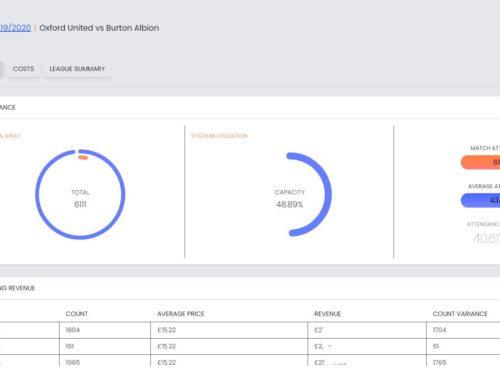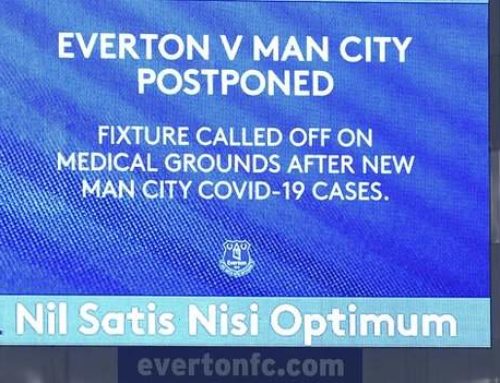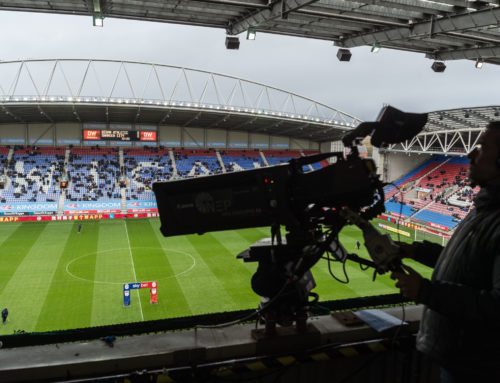BLOG | BY HEAD OF INTERNATIONAL BUSINESS ALEX IACOPONI
The pandemic will cost over €8 billion to clubs and puts 120 teams “at existential risk” – why real-time financial intelligence is now needed.
The Covid-19 pandemic and the resulting health crisis will cost European football clubs over €8 billion over two seasons, marking a sharp setback after 20 years of uninterrupted growth.
This is indicated by the annual Uefa interactive report (The European Club Footballing Landscape). According to the report there are 120 teams “at existential risk” due to financial difficulties.
UEFA’s conclusions are that the pandemic has not spared any team, depriving the entire sector of “at least” 10% of the expected revenues for 2019-20 and 2020-21.
Over the two seasons that had to deal with the health crisis, according to UEFA estimates, the lost revenues for the 55 European leagues amounted to €8.7 billion, €7.2 billion of which for the 711 most important clubs and €1.5 billion for the smaller ones.
The European Club Association, for its part, had estimated lost earnings for European clubs in 2019-2020 and 2020-2021 at €4 billion, but last December its former president, Andrea Agnelli, spoke of a much higher impact, in the range between €6.5 and €8.5 billion euros.
According to Uefa, stadium closures were the first to weigh, which for the 711 elite teams caused a reduction in ticketing revenues between €3.6 and €4 billion across the two years and of course the return to full stadiums still remains shrouded in uncertainty.
Commercial revenues are then indicated as decreasing by €2.4 – €2.7 billion, while TV rights will be cut by €1.2 – €1.4 billion over the two seasons and with renegotiations already underway to reduce them by €700 million euro after 2021 for Uefa broadcasters and the five main leagues.
The clubs most affected are the French ones, with a 30% drop in global revenues, together with Scottish clubs.
The crisis has interrupted two golden decades for European football, which had recorded an average growth in revenues of 8.2% a year since 1999.
In the two decades, however, salaries have also risen, which have come to absorb 60% of revenues, a share “significantly higher than any other sector, including the investment bank”, observes UEFA.
Regarding cash flows, a key issue given the high levels of debt in the sector, UEFA expects around 120 clubs to be at “existential risk” while the others will compensate for their losses by resorting to new loans or appealing to owners. .
Convention for the future of football
Uefa has therefore announced the launch in the coming months of an important consultation process to bring all stakeholders of European football closer together and strengthen the future of football for the benefit of all. In the coming months, The conference will bring together representatives of national football associations, leagues, clubs, players, coaches, fans and agents to discuss long-term political and governance reforms.
Aleksander Čeferin said: “The whole football ecosystem, professional, amateur and youth, have been heavily disrupted by the pandemic. This requires deep cooperation and a co-ordinated response across the football pyramid. Solidarity, not self-interest, must prevail and will win the day.
ClubView is designed to protect the integrity of the European football pyramid, empowering Leagues with financial intelligence for the benefit of all their clubs.
Our technology is the football industry’s independent platform to monitor, benchmark and protect the financial health of clubs, leagues and the entire football pyramid.
The real-time data that the ClubView system collects from clubs on behalf of their leagues can be used as an independent foundation for any regulation.
It also benefits every club, as they will receive regular, actionable, financial intelligence reports and insights.
The Leagues and Associations in partnership with ClubView will be able to build a sustainable future for their member clubs with real-time financial intelligence and insights for the future good of football.
Change is clearly needed, and we are ready to help play our part in helping the sport we love to recover from the impact of the pandemic, to build a sustainable and fair future across the game.





